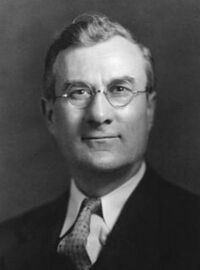User:Milton Beychok/Sandbox
Warren Kendall Lewis (August 1882–March 1975) was a major leader in the development of chemical engineering. He has often been referred to as the father of modern chemical engineering for his role in coordination of chemistry, physics and engineering into an independent discipline serving the chemical industry.
Born on a farm in Delaware, Lewis transferred to Newton, Massachusetts during his high school days. He subsequently entered the Massachusetts Institute of Technology (MIT) in 1901 and enrolled as a mechanical engineering student. A year later, he transferred to the chemical engineering option of MIT's chemistry department. He graduated with a degree in chemistry and, following a year as a laboratory assistant, was awarded a fellowship to study physical chemistry at the University of Breslau (Universität Breslau)[1] in Germany. After receiving his Sc.D. degree in 1908, Lewis did a brief sting in industry and then joined the faculty of MIT as an assistant professor in 1910. He was promoted to a full professor in 1914 and subsequently served as the first head of MIT's new chemical engineering department from 1920 to 1929. [2][3][4]
References
- ↑ In 1741, King Frederick II of Prussia seized Lower Silesia (which included the city of Wroclaw) from Poland, annexed it to Germany and renamed Wroclaw as Breslau. Two centuries later, at the end of World War II, most of Lower Silesia (including the city of Breslau) was returned to Poland and Breslau was renamed again as Wroclaw. The University of Breslau is now known as the University of Wroclaw.
- ↑ Biographical Memoirs: Warren Kendall Lewis National Academies Press
- ↑ 1947: Warren K. Lewis C&EN Special Issue, 85th Anniversary of the Priestley Medal – Vol. 86, No. 14, April 7, 2008
- ↑ R. C. Darton, D. G. Wood and R. G. H. Prince (Editors) (2003). Chemical Engineering: Visions of the World, 1st Edition. Elsevier Science. ISBN 0-444-51309-4.
